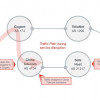Anti-American hackers in Pakistan pose threat to United States
Anti-American cyberpunks in Pakistan are among potential hackers who could launch cyber attacks against the USA as an aftermath of the American air attacks on Afghanistan. A study titled “Cyber Attacks During the War on Terrorism,” conducted by the Institute for Security Technology Studies at Dartmouth College, USA, immediately after the September 11 attacks, has warned the US Government that several Pakistani groups who have defaced several Indian sites in the past were potential attackers in the current scenario.
Significantly, the FBI on Friday issued a warning to the US citizens to be on alert against cyber attacks and to notify it of any suspicious activity on the Net. The study says: “Muslim groups around the world could become players in this scenario, and many have significant experience in launching sophisticated and sustained cyber attacks. In this context, a variety of pro-Muslim hacker groups, such as the G-Force Pakistan, The Pakistan Hackerz Club or Doktor Nuker, could use these tactics against the USA and its allies.”
Pak hackers pose cyber threat to USA
Raman Mohan
It pointed out that sympathizers on both sides of the Kashmir conflict have used cyber tactics to disrupt each other’s information systems and disseminate propaganda. Pro-Pakistan hackers eager to raise global awareness about the conflict have hit Indian sites especially hard.
“The number of pro-Pakistan defacements of Indian Web sites has risen markedly over the past three years: 45 in 1999, 133 in 2000, and 275 by the end of August, 2001. Indian sites defaced by Pakistani hacker groups have either been political, highly visible, or involved in information dissemination (for example, the Indian Parliament, the TV network Zee, the Asian Age newspaper, the Indian Institute of Science, and the Bhabha Atomic Research Centre.) In the case of the Bhabha Atomic Research Centre, five megabytes of possibly sensitive nuclear research or other information was reportedly downloaded. Another pro-Pakistan hacker group, the Pakistan Hackerz Club, has also targeted US sites in the past, defacing sites belonging to the Department of Energy and the US Air Force”, it adds.
The study points out that many foreign nations have identified the utility of developing cyber attack techniques for purposes of engaging in covert espionage against US Government networks or US industry, or for employing information warfare against the US. Amongst the nations thought to be developing information warfare capabilities are Iraq and Libya, who could be targeted by US and allied strikes as part of the war on terrorism. Referring to recent trends in cyber terrorism, it says that China, North Korea, Cuba and Russia, among others, are also believed to be developing cyber warfare capabilities.
What are the areas which could be targeted by cyber attackers in the USA? Banking and financial institutions utilize infrastructures that are vulnerable to cyber attack due to their dependence on networks. However, since this sector still operates through largely private networks and intranets with very limited external access, thus affording it some protection from external cyber attack.
Likewise, voice communication systems are vulnerable to proprietary software attacks from insiders familiar with the technical details of the system. This includes the emergency services of telephone exchanges. Another area of concern are electrical infrastructures that have sensors to assist engineers in shutting down components of the national grid in event of a natural disaster, which could become vulnerable to cyber manipulation, potentially resulting in power outages. Similarly, water resources and the management of water levels are often controlled by sensors and remote means. These could be particularly sensitive to attacks unless physical security was ensured. Oil and gas infrastructures too widely rely on the use of computerized Supervisory Control and Data Acquisition (SCADA) and Energy Management Systems (EMS). These systems could be vulnerable to cyber attack with the potential of affecting numerous economic sectors, such as manufacturing and transportation.
The following are the kind of potential attacks the USA faces in the cyberspace: defacement of electronic information sites in the USA and allied countries and spreading disinformation and propaganda, denial of service to legitimate computer users in the USA and allied countries through Denial of Service Attacks (DoS), the use of worms and viruses and the exploitation of inherent computer security vulnerabilities and unauthorised intrusions into systems and networks belonging to the USA and allied countries, potentially resulting in critical infrastructure outages and corruption of vital data.
SNP.









































































